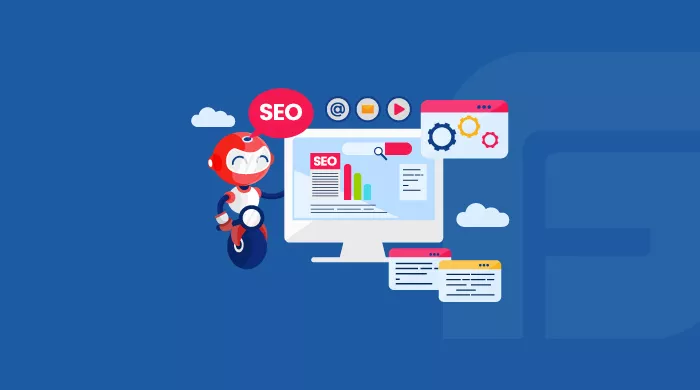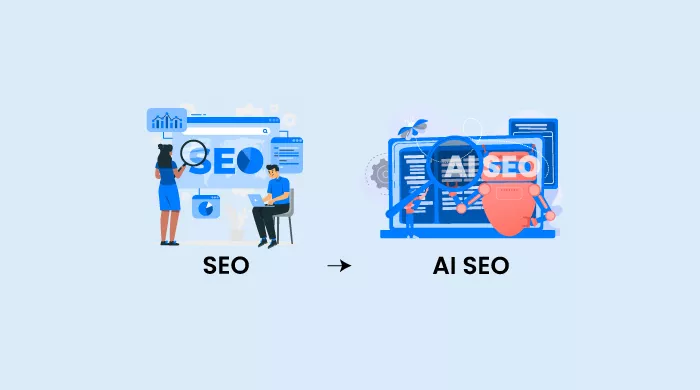Do you know that Google has to process approximately 70,000 searches per second and nearly 5.8 billion search queries every day? These figures may seem mammoth, but they tell you the ever-expanding number of global internet users.
Now just imagine the scenario. You have got a new business website. Of course, you aim to get more customers on board. But do you think that merely creating an engaging and responsive website guarantees to bring traffic to your online business?
Well, precisely, nine out of ten entrepreneurs will answer no to the above question. Then what are the viable options to generate more traffic and sales?
One popular tactic is using Search Engine Optimization. SEO is the process of enhancing both the quality and quantity of organic traffic to any website.
But do you know what is the most crucial ingredient or component of search engine optimization? Any guesses?
The answer is the keyword. By researching the right set of keywords through SEO tools, you can optimize your website and expand your online presence.
The following blog will provide you with a comprehensive overview of keyword research and optimization. After reading the blog, you will have a clear understanding of how a keyword works, why keyword research is essential, and tips for choosing the right keywords. Plus, you will also learn the role of SEO software and keyword tools in growing traffic and more. Hence, stay tuned!
Definition of the Keyword
So, how will you define a keyword? You can define a keyword as a search term or phrase that an internet user enters on Google or other search engines to find relevant information. The internet user gets result pages where an array of websites get listed according to search engine rankings.
Hence, the most crucial role of a keyword is to optimize the content. It also improves ranking to gain the top spot on Google and other search engines.
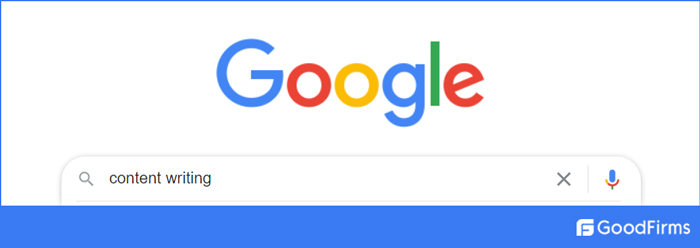
In the above image, the keyword "content writing" has been entered into the Google search engine to get the desired results.
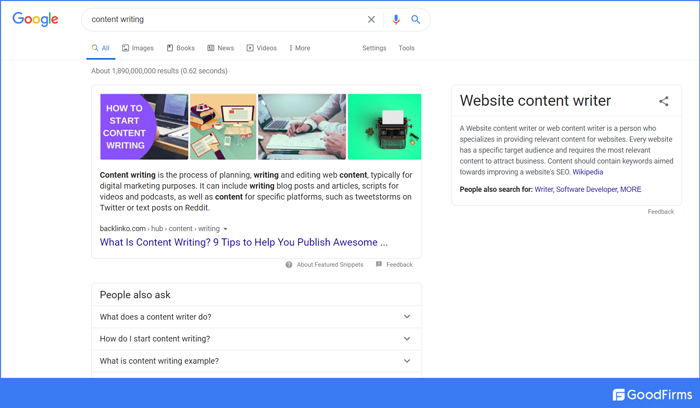
You can use advanced SEP tools and software to view and analyze the Google ranking history of a keyword. Also, the SEO software allows you to track your rankings at regular intervals and compare your site’s performance against competitors.
Defining the term keyword research
Now that you are familiar with the basic concept of a keyword, the blog proceeds to discuss keyword research.
Keyword research is an integral part of the search engine optimization process. Digital marketing professionals have to identify, find, and analyze popular search terms and phrases that people enter into search engines when looking for any products, services, or any other information.
Keyword research also allows SEO professionals to clearly understand and analyze the value of specific keywords and their competitiveness in terms of search engine results. It helps them to bring more organic traffic and improve rankings.
Keyword research is a core aspect of content marketing, enabling bloggers and content creators to discover unique and creative ideas for the next blog topic.
One can further illustrate keyword research with an image-based example.
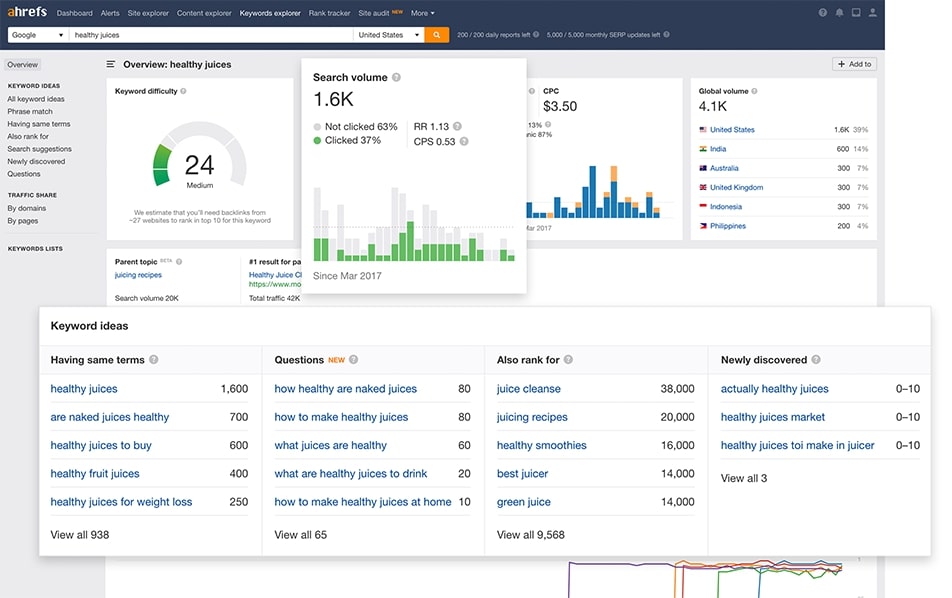
image source: Ahrefs
The Types of Keywords
You will agree that search engine optimization without keywords is a lock without a key. At each online marketing stage, you need to use a different set of keywords to reach out to varied target audiences. Hence, it becomes pivotal to choose the right type of keyword to nail down your SEO efforts. That's when you can expect to drive quality organic views, conversations, and traffic.
To be honest, there are various types of keywords, but primarily, they can be categorized into two categories. They are-
- Short-tail keywords- Usually, a short-tail keyword contains three or fewer words. They can also be referred to as head keywords. The key feature of a short-tail keyword is that it is highly competitive but has a high search volume on search engines.
You must note that internet users generally type short-tail keywords when they are searching for information or a product for the first time. Knowing the search intent for short-tail keywords can be challenging.
For example, if someone searches COVID 19, he/she might want to know what is COVID 19 disease, its symptoms, or the precautions against the disease.
- Long-tail keywords- Long-tail keywords comprise three or more words. These keywords are quite specific when it comes to search intent. The search volume is lower in comparison to short-tail keywords, but they are less competitive as well.
For instance, if someone is searching for precautions against the COVID-19 Virus, then indeed he/she wants to know the protection measures against the COVID-19 virus. When a user does a long search or enters more than three words, he is likely to read your content or make a purchase.
The Importance of Keyword Research
The next question that comes to mind is, why do you need to perform a keyword search? Of course, it helps to improve your site ranking and increase your web traffic. However, various other pivotal reasons define the importance of keyword research.
- Helps to target the audience strategically: Have you heard of the popular saying that keyword research is your audience research? You need to know who your target audience is. You may be writing engaging and informative content, but a proper keyword analysis will help you analyze what products and services they are looking for. It also allows you to understand your users' intentions and curate your content following their preferences.
For instance, if you are looking to market your free and open-source software, say inventory management software. you can target different keywords such as best free and open source inventory management, open source inventory management tool, free inventory management system, and others.
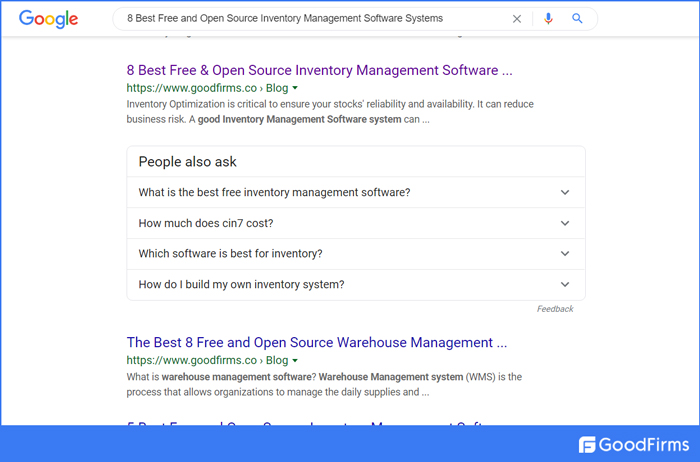
- Find keywords with low competition: When researching keywords, it's essential to know the level of competition they face. You can determine this using an efficient keyword research tool such as Google Keyword Planner.
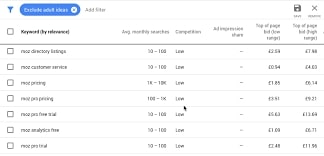
Image source: Ahrefs
One crucial factor determining whether the competition is low, medium, or high is location and search network. The stiffness of the competition also depends on the number of marketers bidding for specific keywords. You will also be able to determine how many websites are competing against the same keywords.
- Search keywords with high volume: What do you mean by keywords with high search volume? It means keywords that are searched by a large number of people. You can measure it universally using an Average Monthly Volume (AMV).
For instance, your IT Company develops software. Your website may receive a good ranking with the keyword 'agile software development. Let's say it receives about 300 searches per month. You can do a comparative study with the keyword 'software development,' receiving about 5000 searches per month, and view the results.
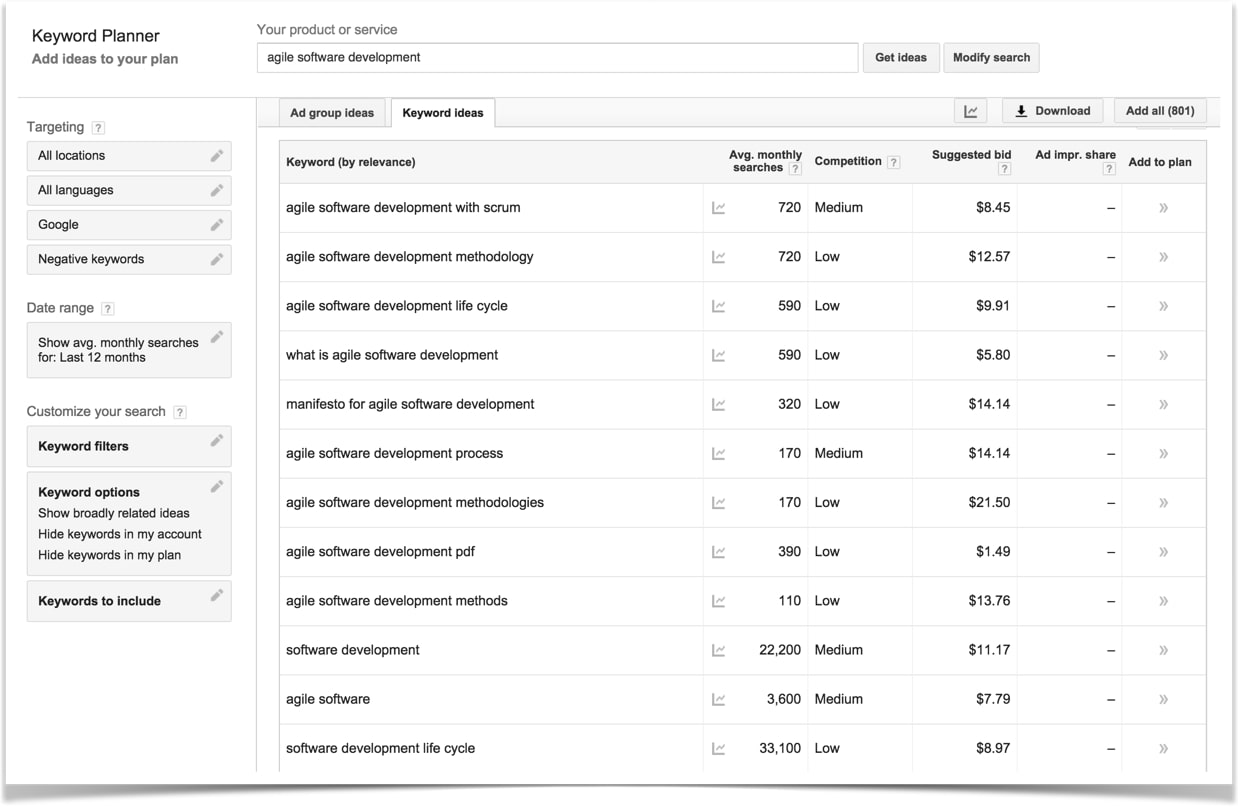
Image source: Pinterest
- Get more strategic content ideas- Working on keyword research allows you to get more fresh and unique ideas for your content. Having a set of relevant keywords also enables you to create an outstanding content strategy specifically for the landing pages.
- Efficiently Utilize Your Time- Keyword research also helps a great deal in utilizing your time properly. You can prioritize high-volume keywords and terms with low competition instead of devoting more time to creating content that does not generate success.
- Understand the latest SEO trends- It's essential to understand the latest SEO trends when planning to optimize your website or blog. SEO Software plays a vital role in analyzing your target audience's search pattern with the help of an advanced tool such as Google Trends.
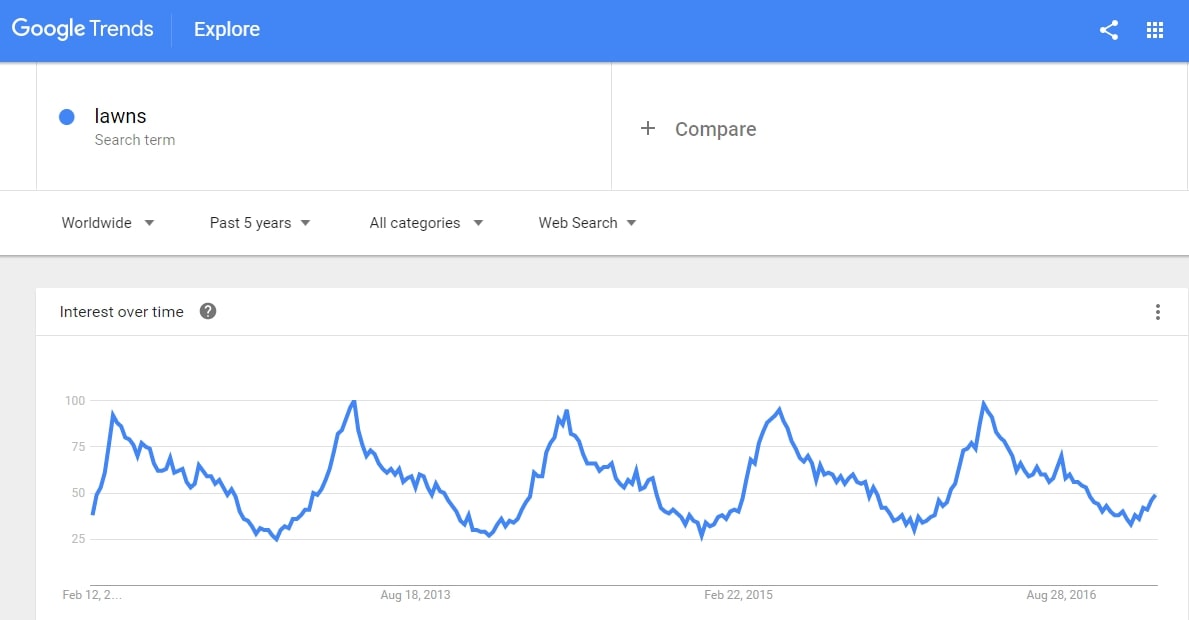
Image source: WordStream
- Look for new terms- At times, the audience may search for new words that are relatively fresh in search engines. Keyword research helps you explore and find out new keywords that you aren't familiar with. You can search for new keywords both on your website as well as your competitor's site.
How does a keyword work
Once you have researched the best keywords for your website and content, it's time to make them work to drive more traffic. It's okay that you are using the best SEO practices by including various highly searched keywords and optimizing the website with those search terms. But you cannot start stuffing the keywords on a single page and expect that every time your keyword will rank on search engines.
So, the best way a keyword can work is through proper keyword grouping and organization. You can categorize all the relevant keywords into small manageable categories and create targeted web pages.
For instance, if you are operating a cake and gifts website, you can group all keywords related to online cake and gift-related items. Then, you can create a subcategory of all cakes, such as online birthday cakes, chocolate cakes, customized anniversary cakes, cakes for special occasions, wedding cakes, and much more. After completing this, you can design individually optimized pages for each of the small keyword groups.
When optimizing the website page for SEO purposes, make sure that you use keywords in
- The page title
- The URL.
- The meta tags
- The image file paths and image alt text.
- Use keywords as anchor text.
Also, keep in mind the keyword density and relevance during the page optimization.
The Role of Intent in Keyword Research
The keyword intent plays a pivotal role in improving the conversion rate. Do you think the purpose of keyword intent is over with this short, simple statement?
Nope.
The keyword intent serves as one of the most critical steps when you need to match your content with the specific requirements of the user. It helps you to understand and analyze the user's intentions. The keyword search intent can be categorized into five different categories, namely-
Navigational- When the internet searcher knows what exact information he/she wants or which website he/she is willing to visit. For example, somebody is directly going to the Goodfirms site to explore the software categorypage.
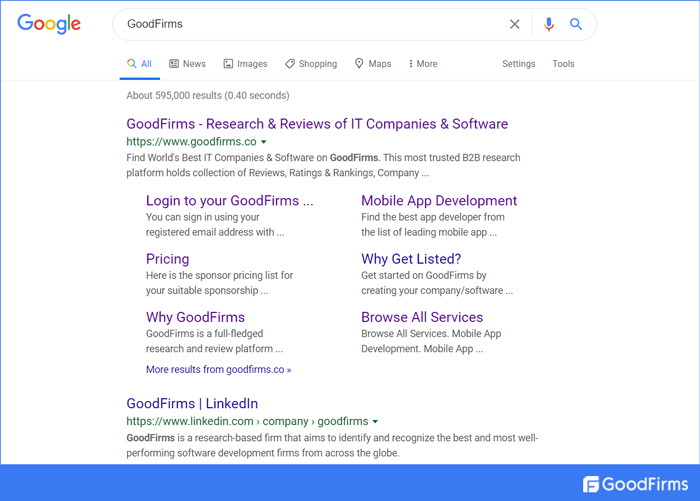
Informational- When a searcher wants to know precise information about a particular person, place, measurement, etc. For instance, if someone enters the keyword 'How Much is $100 in Indian Rupees'.
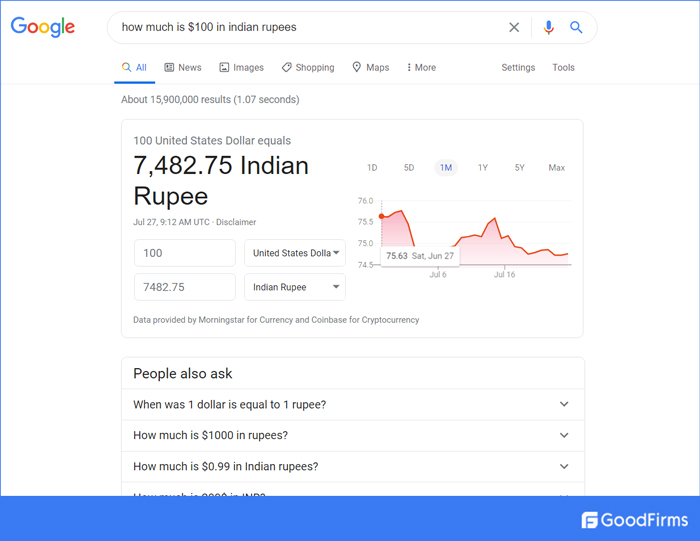



Tips to Find the Right Keywords for Improved SEO
Search Engine Optimization (SEO) can increase your website traffic and improve your rankings on various search engines only if you select the right keywords. Follow the tips to find out the right keywords for improved SEO.
-
Start thinking from a customer's point of view: The marketing rule suggests that if you want to increase your customer base, start thinking like a consumer. You can apply the same standard to find out the right keywords. For example, if you wanted a product, what would you have typed on Google? Don't hesitate to consult a few target customers.
-
Focus more on long-tail keywords: The blog has already briefly discussed long-tail keywords. It's essential to focus more on long-tail keywords as they attract more traffic and are less competitive. Long-tail keywords allow more scope to specify your products or services.
-
Study and analyze your competitors: One optimal technique for getting across the right keywords is to study and analyze your competitor's site thoroughly. This helps you identify the same or different keywords your competitors use for a similar product category.
-
Make use of SEO Software and keyword optimization tools: If you want to choose the right set of keywords and maximize your online traffic, it's crucial to use SEO Software and SEO tools. Popular examples include Google Trends, Ahrefs, Moz Pro, SEMrush, and many more.
-
Analyze the results- Your job is not yet over. Once you have selected the keywords, it's time to track and analyze them regularly. The Keyword research tool will come in handy when you monitor the latest trends and new keywords.
The Role Of Keyword Tools in Growing Your Seo Traffic
You can even flip this question and say what role SEO software plays in increasing traffic and improving ranking. So, let's dig out the answer.
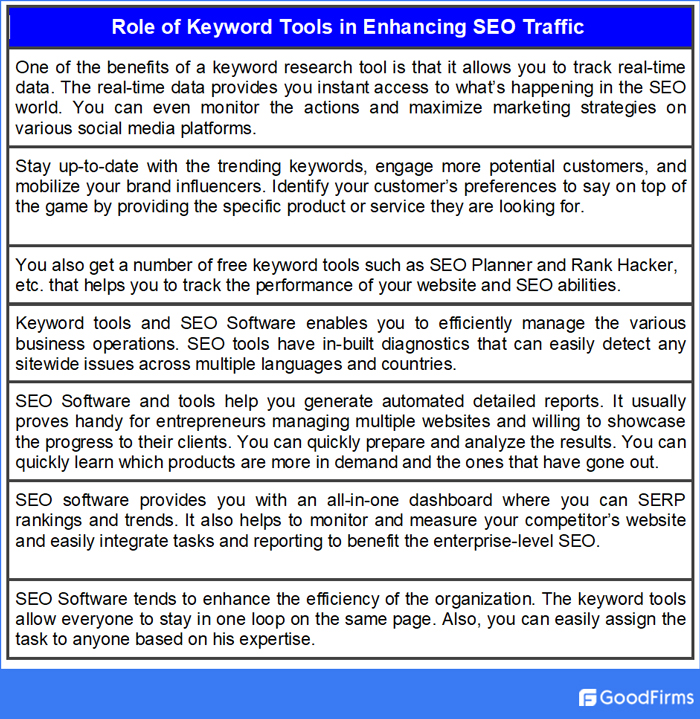
What Makes a Good Keyword?
How will you illustrate a good keyword? Well, to be honest, you can define a good keyword in various ways. They are either highly targeted or very broad. But getting across good keywords is pivotal as it can help in reshaping your SEO strategy. High-targeted keywords always give your site an edge with higher conversion rates.
There are three essential factors that distinguish an ordinary keyword from a highly searched good keyword.
- Search intent- It helps to match the content’s intent with the specific intent of the searcher.
- Search volume- When a particular keyword gets searched for the average number of times in a given time period. It aims to drive relevant web traffic to a website.
- Competition- It is the search term that you are willing to get a higher ranking
What is keyword optimization?
To be precise, there is not much of a difference between keyword research and keyword optimization. Keyword optimization also involves researching, selecting, and analyzing the optimal keywords to target the best potential customers. It aims to drive quality traffic and surge online sales.
Areas Where Keyword Optimization is Performed
Keyword optimization is an integral part of digital marketing, social media, and content marketing strategy. It also plays an imperative role in link building, keyword grouping, and organizing the content on the website.
The key areas where keyword optimization proves handy are-
- Search engine optimization- The success of search engine optimization largely depends on how you conduct keyword discovery and research. Optimizing keywords helps to maximize every aspect of SEO efforts.
- You must include target keywords in title tags, meta descriptions, links, images, URLs, and Content.
- Social media keyword optimization- Social media is as important as SEO in driving valuable traffic to your site. Hence, you need to determine which keywords to focus on optimizing your social media posts to gain audience attention. The good idea is to do keyword research for Facebook, Twitter, Instagram, LinkedIn, and YouTube.
- PPC keyword optimization- If you think keyword optimization is restricted to social media optimization and social media marketing, think again. What about optimizing the PPC keywords? The success of your PPC campaign depends on what keywords you research and select to gain more traffic.
You can start by creating a keyword list, grouping them, segmenting the keywords, adding them to your content, and then optimizing your landing pages. Not to say that you can also integrate the SEO Software and tools to accelerate this entire process and unleash optimal results.
Is on-page keyword optimization critical?
Before discussing the importance of on-page keyword optimization, it's important to briefly highlight what on-page optimization is.
In simple terms, on-page optimization is the process of optimizing each web page individually. This optimization is done for both the HTML source code and the content. The purpose of on-page optimization is to get high ranks in different search engines and attract more potential traffic.
Various essential factors determine the success of on-page keyword optimization. The important ones include E-A-T Content, headlines, title tags, meta descriptions, header tags, keyword cannibalization, SEO writing, and much more.
The image below highlights the essential on-page SEO factors.
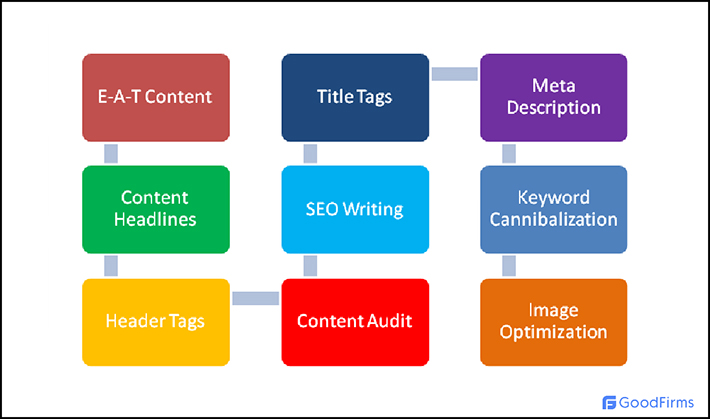
The Importance of on-page keyword optimization
On-page keyword optimization has gained much impetus because it powers search engines to understand and analyze your website and its content. It also identifies whether the searcher's query is relevant to the site or not.
You must note that search engines like Google prioritize the semantics and relevance of the SERPs (search engine page results). Moreover, Google also keeps updating its algorithms to provide a much-improved understanding of what internet users are searching for and delivering accurate results to meet their expectations.
You can align your on-page keyword optimization with SEO software tools to adapt to the latest and best optimization practices where content is easily visible in all formats; text, images, and videos.
Over-optimization is a bad idea
On-page keyword optimization has gained much impetus because it powers search engines to understand and analyze your website and its content. It also identifies whether the searcher's query is relevant to the site or not.
You must note that search engines like Google prioritize the semantics and relevance of the SERPs (search engine page results). Moreover, Google also keeps updating its algorithms to provide a much-improved understanding of what internet users are searching for and delivering accurate results to meet their expectations.
You can align your on-page keyword optimization with SEO software tools to adapt to the latest and best optimization practices where content is easily visible in all formats; text, images, and videos.
How to know if the site is getting over-optimized
The various signs that indicate the over-optimization of the website are-
-
Over-stuffing of the keywords
-
Use of unnecessary keywords
-
Linking to toxic websites
-
Overuse of H1 tag in content
-
Indicating all external and internal links to a top navigation website.
Essential steps for keyword optimization
Keyword optimization leads to improving organic search results. It enhances both search engine rankings and click-through rates. But you should also be aware of the pivotal steps for keyword optimization, which are as follows-
Focus on keyword mapping- Keyword mapping is a practice in which you choose a set of keywords to target your audience. SEO tools are also a part of keyword mapping that help you find out where and what content to optimize and new pages on your site. You also help your customers in mapping their buying journey through different stages. These include awareness, consideration, and decision stages.
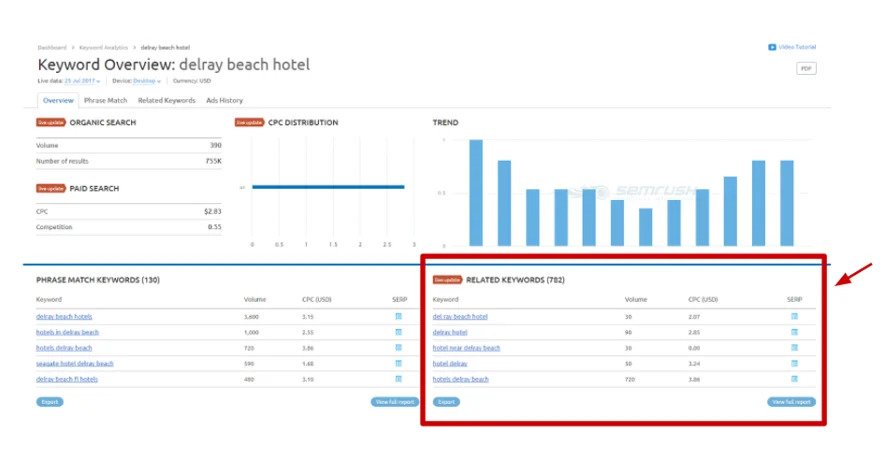
Image source: SEMrush
Prioritize building a keyword list: Next, you have to prioritize creating a list of essential keywords that will help you divert more traffic to your site. Segregate your web pages based on topic and conversion rates. Use keyword search tools and SEO Software to find high-ranking keywords.
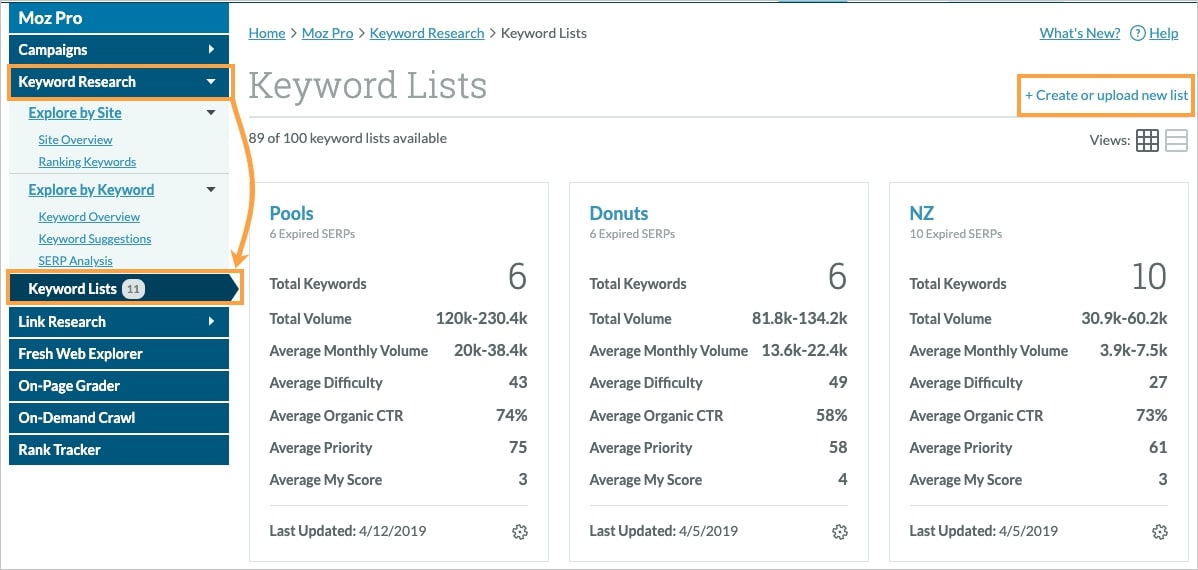
Image source Moz Pro
Pay attention to mobile keywords: Smartphones and other smart gadgets have become incredibly popular in recent times. Millennials and Gen Z customers search for products and services on their mobile devices. Hence, it becomes pivotal to focus on mobile-based keywords to gain the attention of such target audiences.
Ensure content is indexed: You need to ensure that all your essential content is well-indexed. One of the best methods to verify this is to check Google's text-only version or Bing's cache version. You need to check the page analyzers or crawlers. Also, you need to make sure that the indexed content is unique and free from duplicate text.
Keep an eye on keyword trends: Leveraging keyword trends' benefits can lead to a big bonus when it comes to escalating traffic. Implementing the best free and open-source SEO software will certainly prove icing on the cake. Top-notch SEO software and keyword research tools such as Moz Pro, Ahrefs, and SEMrush help you use the most trending words and the latest SEO practices.
Add the headline and optimize the Content: Adding a catchy headline can draw the visitor's attention to go further and read the content. It is essential to include the primary keyword in your headline to generate the backlinks. Also, it gives an idea to the reader what the content is all about. Again, there are a few popular SEO software, such as CoSChedule, that help you write eye-catching headlines. In addition to that, you also have to optimize your content regularly with the help of content editing tools.
Keyword auditing: It is interesting to note that SEO Software also plays a vital role in keyword auditing. Keyword auditing is mainly done after keyword listing. You can use advanced tools such as WooRank, SpyFu, and SEMRush to audit the keywords.
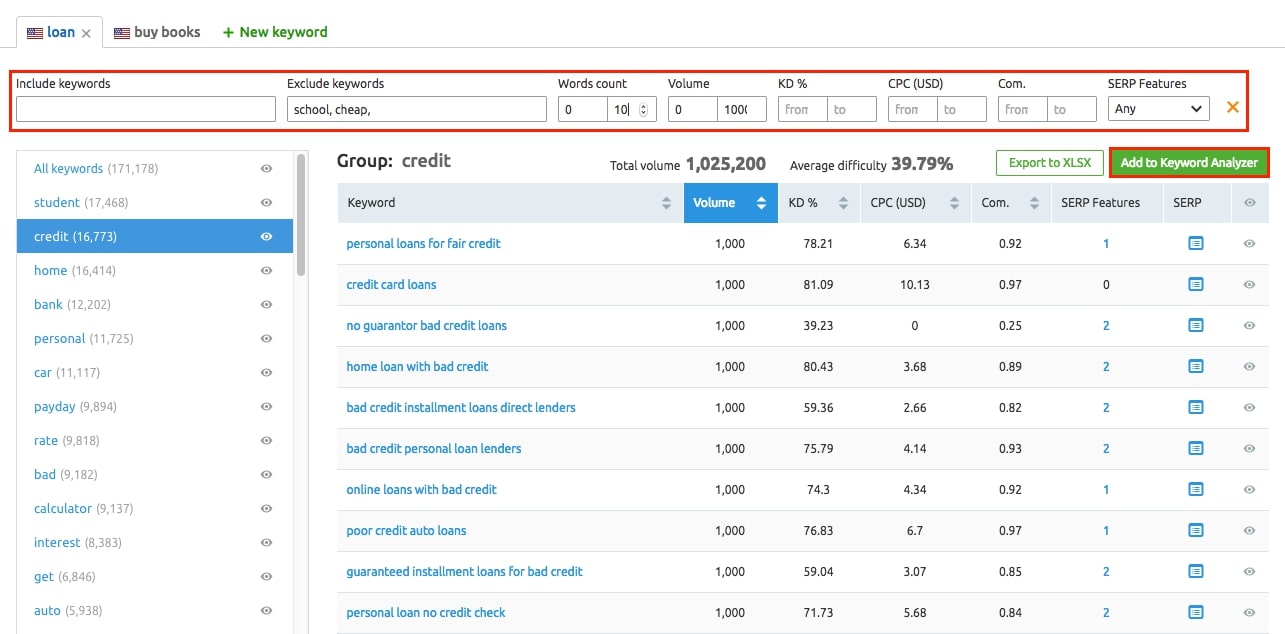
Image source: SEMrush
Tracking the internal site search: Well, the critical fact is that some essential keywords are present within the website, which you may not be aware of. Thus, it is crucial to keep tracking your website to get an idea of what people are looking for.
If you find that some vital piece of content is missing from your site, it can also add that.
Conclusion
Keyword research and optimization are among the most critical SEO-related activities that can help you get the highest return. With countless websites getting optimized regularly on search engines, online business competition is becoming stiffer, posing complex challenges.
But a leading and popular SEO Software and keyword tool will help you give your site an edge over your competitors with the right keyword search. The blog has even highlighted essential aspects regarding the necessity of keyword research, the role of keyword intent, and the importance of keyword tools in growing SEO traffic. Also, the SEO Software buyer’s guide will provide you with a comprehensive overview of the various SEO tools and help you select the best software.
If you want to know about various other software categories or if you are willing to share your experience regarding using software, please visit the Goodfirms site.





